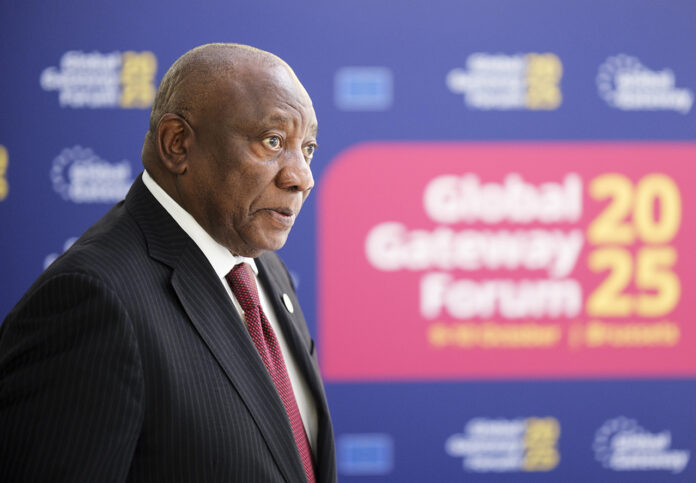President Cyril Ramaphosa used an address to the Swiss parliament in Bern on Tuesday to make a robust case for Switzerland as a pivotal economic partner, even as his vision of a “green, just, and inclusive” future for South Africa faces severe domestic headwinds.
Ramaphosa began by praising Switzerland’s democracy, prosperity, and commitment to peace—a classic opening gambit to butter up the hosts.
“Yours is a country that is admired around the world for its democracy, prosperity, and commitment to peace,” he said.
This set the stage for a carefully curated narrative of mutual admiration, even as the realities beneath the surface—such as Switzerland’s history as a safe haven for global capital—remained unspoken.
But let’s not let inconvenient truths spoil the diplomatic niceties.
In a speech that highlighted trade and foreign direct investment, Ramaphosa positioned South Africa as a hub for renewable resources ripe for Swiss expertise in clean technology and sustainable finance.
“Switzerland is one of South Africa’s main trading partners and a leading source of foreign direct investment,” he told his hosts, presenting an optimistic outlook for potential investors.
Economic cooperation
The president’s speech leaned heavily on economic cooperation, painting a rosy picture of Swiss investment in South Africa.
“Swiss investors are creating opportunities, transferring knowledge and driving transformation.”
It was, however, a bold claim in a country where economic power remains concentrated in the hands of a few and unemployment hovers at crisis levels.
The South African leader’s speech touted partnership on green technology and sustainable finance, with a flourish of buzzwords.
“South Africa’s renewable resources combined with Swiss expertise in clean technology and sustainable finance can lead the way to a future that is green, just and inclusive,” he said—as if the mere mention of “green” and “inclusive” could absolve both nations of their environmental and social challenges.
South Africa’s renewable energy sector, after all, has been slow to take off, hampered by bureaucratic inertia and vested interests in coal.
Meanwhile, Switzerland’s “clean technology” expertise is hardly a panacea for South Africa’s deep-rooted energy and inequality issues
The charm offensive comes as the president’s ANC-led government struggles to revitalise an economy plagued by high unemployment, persistent inequality, and an energy crisis that has hampered growth.
While Ramaphosa praised Swiss investments for “transferring knowledge and driving transformation”, the business environment continues to struggle with bureaucratic inertia and the residual effects of state capture.
Call for strengthened ties
The president’s call for “economic growth and environmental stewardship” to be allies rather than adversaries was another rhetorical flourish that sounded good on paper but rang hollow in practice—especially when South Africa’s mining sector, an economic lifeline, remains among the country’s biggest environmental offenders.
Ramaphosa also touched on empowerment, with lofty promises of women taking their “rightful place in the economy”, young people “igniting innovation,” and small enterprises growing into “mighty engines of prosperity”.
While these are noble visions, they remain disconnected from the lived realities of South Africans struggling under the weight of inequality, unemployment, and systemic corruption.
The South African leader struck a note of global cooperation, praising Swiss conflict resolution and calling for strengthened ties in international forums.
“We must strengthen our cooperation in international fora, ensuring that the voices calling for peace drown out the drums of war,” he said—though this appeal for a rules-based order sits uneasily with South Africa’s own “non-aligned” foreign policy, which has at times equivocated in condemning aggressors, creating friction with Western partners like Switzerland.
Act of repatriation
Ramaphosa’s nod to historical reconciliation—the repatriation of Nkuna royal family artifacts from Neuchatel—was a poignant moment, but one that could not quite distract from the more pressing issues at hand.
“This act of repatriation speaks to who we are—both Switzerland and South Africa,” Ramaphosa said, framing the gesture as a symbol of shared values.
Yet, one can’t help but wonder whether this symbolic act of healing is being used to paper over the cracks in South Africa’s own unresolved historical injustices.
For Swiss businesses, the speech offered a reassuring narrative of opportunity and reform.
Yet the enduring gap between Ramaphosa’s promises of stability and transformation and the complex realities of operating in South Africa remains the central challenge for both the president and the investors he seeks to attract.
In the end, what lingers is the contrast between the polished performance and the unpredictable realities awaiting those who choose to look beyond the theater of diplomacy.



